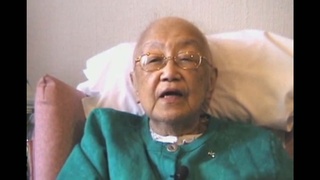Interviews
Prom during the war
I was sophomore when the war broke out. All of the sophomores, we had hardly any social life. Our first junior prom that we had, we were… We had our prom in our cafeteria. We had moved all of our tables off to the side. And the cafeteria there was a very old cafeteria. The floor was very worn, so you know, it wasn’t very smooth—lumps along the lumber there. But we tried to darken the room as best as we can, and that was our junior prom.
I recall our senior prom. We still had curfew, we still had to be off the street by 6 o’clock. And we went to the Mormon Tabernacle on Beretania Street. And we pulled all of the drapes so that it was completely dark and a very dim light. And our senior prom was from 1 o’clock to 3:30.
And so, that’s the kind of social life that we had. We didn’t have very much activities going on. And so a lot of us, our friends that got together and we’d spend time together from one friend's house to another friend's house on weekends. So we developed a closeness among some of the friends that we had in high school.
Date: December 15, 2003
Location: Hawai`i, US
Interviewer: Art Hansen
Contributed by: Watase Media Arts Center, Japanese American National Museum.





